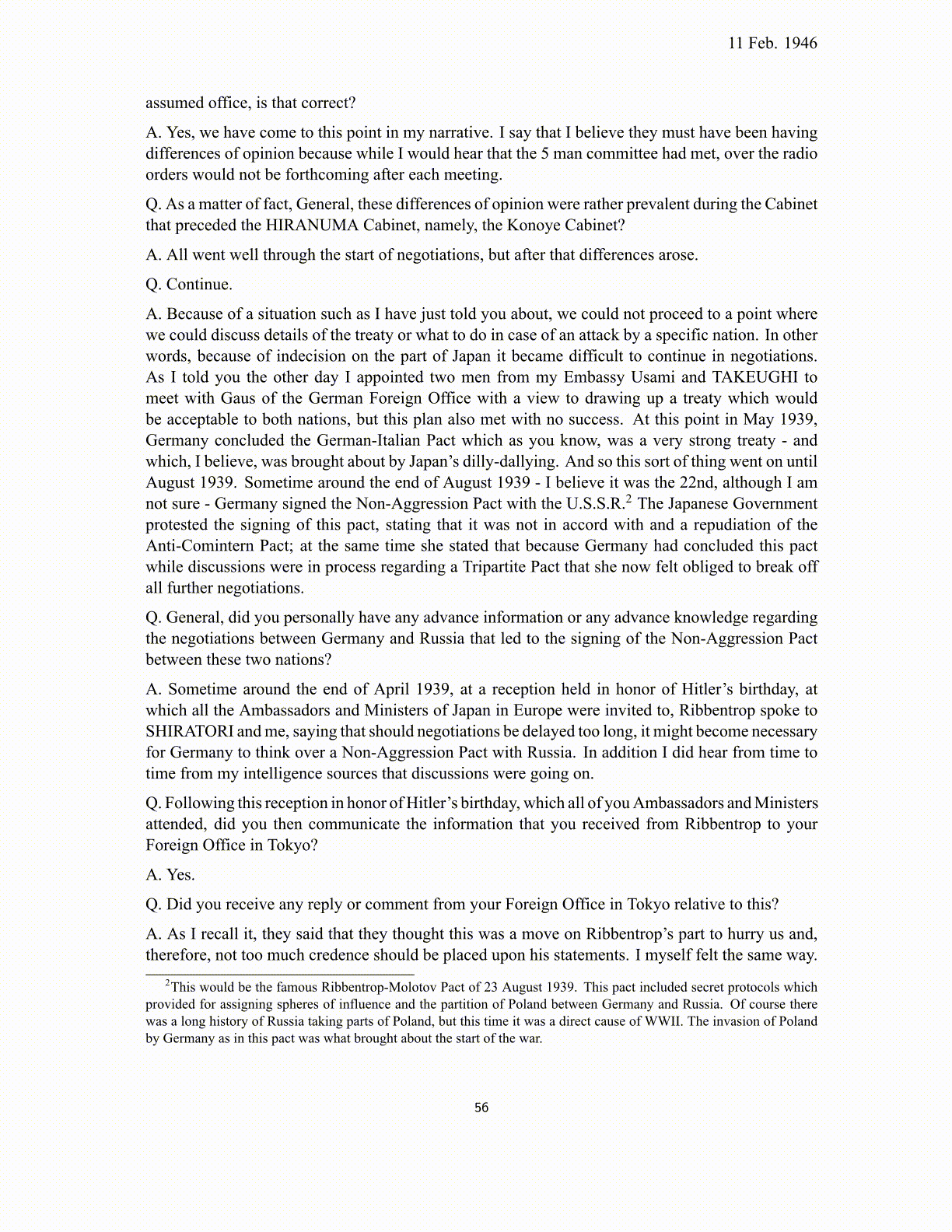
11 Feb. 1946 assumed office, is that correct? A. Yes, we have come to this point in my narrative. I say that I believe they must have been having differences of opinion because while I would hear that the 5 man committee had met, over the radio orders would not be forthcoming after each meeting. Q. As a matter of fact, General, these differences of opinion were rather prevalent during the Cabinet that preceded the HIRANUMA Cabinet, namely, the Konoye Cabinet? A. All went well through the start of negotiations, but after that differences arose. Q. Continue. A. Because of a situation such as I have just told you about, we could not proceed to a point where we could discuss details of the treaty or what to do in case of an attack by a specific nation. In other words, because of indecision on the part of Japan it became difficult to continue in negotiations. As I told you the other day I appointed two men from my Embassy Usami and TAKEUGHI to meet with Gaus of the German Foreign Office with a view to drawing up a treaty which would be acceptable to both nations, but this plan also met with no success. At this point in May 1939, Germany concluded the German-Italian Pact which as you know, was a very strong treaty - and which, I believe, was brought about by Japan’s dilly-dallying. And so this sort of thing went on until August 1939. Sometime around the end of August 1939 - I believe it was the 22nd, although I am not sure - Germany signed the Non-Aggression Pact with the U.S.S.R. 2 The Japanese Government protested the signing of this pact, stating that it was not in accord with and a repudiation of the Anti-Comintern Pact; at the same time she stated that because Germany had concluded this pact while discussions were in process regarding a Tripartite Pact that she now felt obliged to break off all further negotiations. Q. General, did you personally have any advance information or any advance knowledge regarding the negotiations between Germany and Russia that led to the signing of the Non-Aggression Pact between these two nations? A. Sometime around the end of April 1939, at a reception held in honor of Hitler’s birthday, at which all the Ambassadors and Ministers of Japan in Europe were invited to, Ribbentrop spoke to SHIRATORI and me, saying that should negotiations be delayed too long, it might become necessary for Germany to think over a Non-Aggression Pact with Russia. In addition I did hear from time to time from my intelligence sources that discussions were going on. Q. Following this reception in honor of Hitler’s birthday, which all of you Ambassadors and Ministers attended, did you then communicate the information that you received from Ribbentrop to your Foreign Office in Tokyo? A. Yes. Q. Did you receive any reply or comment from your Foreign Office in Tokyo relative to this? A. As I recall it, they said that they thought this was a move on Ribbentrop’s part to hurry us and, therefore, not too much credence should be placed upon his statements. I myself felt the same way. 2 This would be the famous Ribbentrop-Molotov Pact of 23 August 1939. This pact included secret protocols which provided for assigning spheres of influence and the partition of Poland between Germany and Russia. Of course there was a long history of Russia taking parts of Poland, but this time it was a direct cause of WWII. The invasion of Poland by Germany as in this pact was what brought about the start of the war. 56